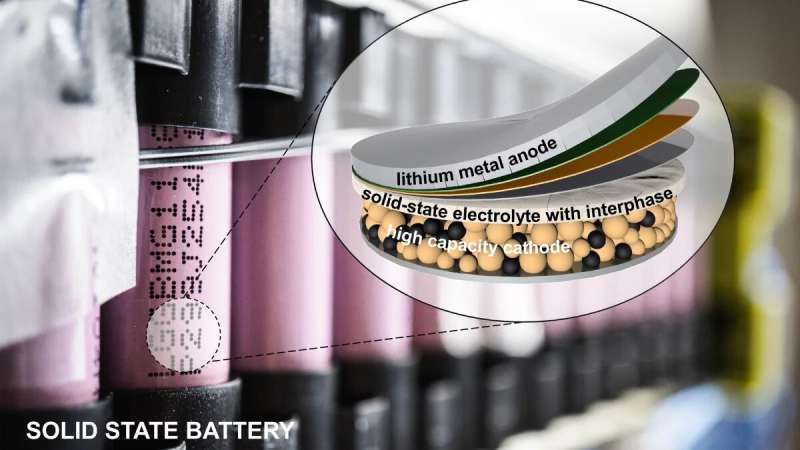
A new technique to make solid-state electrolytes safer and more efficient for solid-state batteries has been developed by researchers from the University of Surrey, the National Physical Laboratory and the University College London. This research could enhance the energy storage capabilities of batteries for use in electric vehicles and mobile devices.
The researchers found a way to manipulate the internal the flow of electrons within the battery to prevent a common problem called “lithium dendrite growth.” This problem occurs when small bits of lithium metal form in a way that can cause the battery to short-circuit or lose power. To fix this, the team created a special layer between the solid-state electrolyte and lithium metal anode that stops unwanted electrons from entering the electrolyte and causing problems—while also increasing the lifespan of the battery. The research is published in the journal Energy & Environmental Science.
Dr. Xuhui Yao, the first author of the paper from the University of Surrey and the National Physical Laboratory, said, “We have developed a solution to address the dendrite growth problem in solid-state batteries, where dendrites can cause the complete failure of the battery. Our approach involves creating a barrier layer that allows the battery to function normally but slows down dendrite growth and promotes their quick elimination, thus making the battery safer and more reliable.”
Solid-state batteries are a type of battery that use solid-state electrolytes (SSEs) instead of liquid electrolytes in conventional batteries. These SSEs are commonly made of ceramics or glass, which enable several potential advantages over traditional batteries, including higher energy density, increased safety due to the absence of flammable liquid electrolytes, and longer lifetimes. The technology is thought to be a promising ingredient to the energy mix that allows the world to transition to a net-zero future.
Dr. Yunlong Zhao, Senior Lecturer and the project leader from the Advanced Technology Institute at the University of Surrey, and the National Physical Laboratory, added, “The scientific community must continue to innovate quicker if the world is to develop energy storage solutions that help the UK and the world transition to net zero. One of the big challenges ahead is how we meet the demand for electric vehicles, and this new method could help confirm solid-state batteries as the right technology for this job.”
More information:
Xuhui Yao et al, Rectifying interphases for preventing Li dendrite propagation in solid-state electrolytes, Energy & Environmental Science (2023). DOI: 10.1039/D2EE04006A
Citation:
New ‘smart layer’ could enhance the durability and efficiency of solid-state batteries (2023, April 5)
retrieved 5 April 2023
from https://techxplore.com/news/2023-04-smart-layer-durability-efficiency-solid-state.html
This document is subject to copyright. Apart from any fair dealing for the purpose of private study or research, no
part may be reproduced without the written permission. The content is provided for information purposes only.
Stay connected with us on social media platform for instant update click here to join our Twitter, & Facebook
We are now on Telegram. Click here to join our channel (@TechiUpdate) and stay updated with the latest Technology headlines.
For all the latest Technology News Click Here
For the latest news and updates, follow us on Google News.
